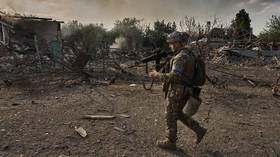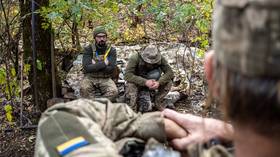Kursk encirclement, Donbass push and drone warfare: The past week in the Ukraine conflict
Some 2,000 Ukrainian servicemen have ended up encircled in Russia’s Kursk Region
The past week in the Ukraine conflict has seen intensive fighting along the front line, with active combat continuing in the border areas of Russia’s Kursk Region, as well as in the Donetsk People’s Republic (DPR), where Moscow has reported making new gains.
The Russian military announced that it had secured two communities in the north of the republic: the village of Serebryanka, located immediately north of the town of Seversk, as well as Novosadovoye, an abandoned settlement adjacent to the border with the Lugansk People’s Republic (LPR).
The latter gain marks a new milestone in Russia’s advance towards the town of Krasny Liman, which was re-captured by Kiev during its autumn 2022 offensive. The liberation of Serebryanka could potentially signal a change of the tide in the vicinity of Seversk, which has seen medium-to-high intensity combat throughout most of the ongoing conflict.
Donbass advance continues
The main frontline events in the DPR continued to unfold near the city of Pokrovsk (also known as Krasnoarmeysk), the last major population center under Ukrainian control in the west of the region.
The Russian military has taken control of Nikolayevka, a village located some 10km to the southeast of the city. It is located only 2km away from Myrnograd, a major town which effectively forms one agglomeration with neighboring Pokrovsk.
Moscow’s forces have also continued to expand their zone of control to the south of Pokrovsk, liberating the village of Zoryanoye. Control over the village likely spells trouble for the Ukrainian garrison in Gornyak, a larger village to its northwest, which is reportedly already under the partial control of Russian forces.
Intense combat has been reported in Selidovo, a sizeable town located some 15km to the south of Pokrovsk. The Russian military reached it in mid-September but opted not to pursue a frontal assault, advancing on the town’s flanks instead.
Unverified footage circulating online suggests that roughly half of the town has already fallen under Moscow’s control, with Russian troops seen unfolding their country’s flag on a high-rise block located at the center of Selidovo. The buildings in the vicinity appear to be largely intact, suggesting that the advance was made without much fighting. Ukrainian forces in the town have reportedly become largely disorganized due to consistent flanking attacks, with the Russian assault teams sipping through the fragmented defenses.
On Friday, multiple Ukrainian online outlets reported a large Russian force breaking into Vyshnevoye, a small nearby village west of the town. The partial encirclement is expected to further aggravate Ukrainian logistics in the area, with the whole town now supplied via a single road, which has been coming under repeated shelling by the Russian troops.
Ukrainian units encircled in Kursk
The Russian military has continued its effort to dislodge Kiev’s forces from the border areas of Kursk Region, which Ukraine invaded in early August. Most active hostilities have continued in the northwest of the area, namely in the vicinity of the villages of Daryino, Zeleny Shyakh, Nizhny Klin, Novoivanovka, Lubimovka and other locations.
Russian forces have reported repelled multiple assaults over the week, as well as conducted attacks on Ukrainian forces in the area. However, no new territorial gains have officially been announced.
On Thursday, Russian President Vladimir Putin said some 2,000 Ukrainian servicemen had wound up encircled in Kursk Region. The troops are trapped in an area measuring 6 by 15 km and Russian forces are working to eliminate the pocket, the president revealed.
Putin did not elaborate on exactly where the Ukrainian forces were encircled and the military is remaining silent on the matter. The pocket is likely located to the south of the villages of Olgovka and Kremyanoye, apparently stretching to the southeast and presumably centered on a small forest some 2.5 km in diameter.
The servicemen who ended up encircled are likely the remnants of disorganized Ukrainian units that had retreated from the aforementioned villages. While being severed from any solid logistics routes, the units trapped in the pocket presumably still have a remote chance of connecting with the forces controlling the village of Malaya Loknya, some 17km to the southeast of Olgovka, through a system of minor dirt roads running across open fields.
Kiev’s forces have apparently tried to dislodge the trapped forces from the pocket, launching multiple attacks on Zeleny Shyakh, a tiny village some 11km to the south of Olgovka, located on the key paved road in the area. Footage circulating online shows a sizable armored Ukrainian unit speeding towards the village along the road. The detachment comes under heavy fire, with at least one of the tanks ending up knocked out by Russian FPV drones.
Attack drones rule Kursk Region’s skies
Over the week, the Russian military has continued to actively use medium-altitude long-endurance (MALE) strike drones to search for and destroy Ukrainian armor in Kursk Region.
Such drones made a surprise comeback to the front line amid the Ukrainian incursion into the region, where Kiev’s forces apparently lack extensive anti-aircraft and electronic warfare coverage. While both sides used MALE drones extensively early in the conflict, they were later rendered ineffective as the front stabilized.
One of the new videos released by the military shows an Inokhodets (Orion) MALE drone striking a Ukrainian self-propelled howitzer. The artillery piece is concealed in a wooded area with only its heated barrel protruding from the shrubbery seen in thermal footage. It apparently sustained a direct hit, with flames visible at the site.
Another new Inokhodets video shows a drone apparently striking a Ukrainian electronic jammer station, a system used to counter UAVs. The station was deployed in a wooded area with its distinctive cupola seen above the foliage. It was not immediately clear whether it was a deployable version of Nota or one mounted on an armored car.
A Ukrainian tank was also taken out in a drone strike, another video released by the Russian military shows. It was discovered parked near a wooded area, with a group of Ukrainian servicemen seen by the vehicle. The tank reportedly sustained a direct hit into its roof, with the blast affecting the nearby troops as well.
Rear strikes continue
The Russian military has continued its concentrated effort to find and destroy high-value Ukrainian assets, staging areas and logistics hubs in the near rear, striking the identified targets with aerial bombs and ballistic missiles.
On Thursday, the Russian Defense Ministry said it destroyed a temporary accommodation point located in the Ukrainian-controlled Donbass town of Kurakhovo. The installation housed Ukrainian UAV operators and instructors, with up to 50 servicemen killed and seven pieces of unspecified military hardware taken out in the strike.
The building used to house the drone operators was hit by a three-ton FAB-3000 high-explosive bomb, apparently fitted with a Universal Correction and Guidance Module (UMPK) winged upgrade kit. The massive munition flattened the building with a large fire observed at the site, footage released by the Russian Defense Ministry shows.
The Russian military has destroyed a German-made IRIS-T anti-aircraft system, footage circulating online suggests. Multiple systems of the type have been destroyed over the past few months and such units have now become a somewhat rare sight near the front line.
The IRIS-T was reportedly detected near the village of Velikaya Kostromka, in Ukraine’s Krivoy Rog Region. It was on its way to its firing position and repeatedly made stops to hide in wooded areas along the way.
When it finally reached its position, it was hit by a Russian Lancet-family loitering munition. The strike sparked a fire on board, with the crew of the anti-aircraft system showing little effort to try and extinguish it, presumably due to fear of a double-tap strike, footage suggests.







Comments are closed.